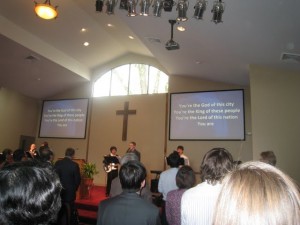Extemporaneous Preaching
 Consider preaching extemporaneously. For 30 years I preached by reading from a typed manuscript, perhaps like the way most UBFers deliver their Sun messages. But over the past few years, I began preaching extemporaneously without reading from a manuscript. After proposing 8 ways to improve our UBF messages, I would like to also suggest and propose that UBFers consider extemporaneous preaching as a way that could potentially improve the way one preaches.
Consider preaching extemporaneously. For 30 years I preached by reading from a typed manuscript, perhaps like the way most UBFers deliver their Sun messages. But over the past few years, I began preaching extemporaneously without reading from a manuscript. After proposing 8 ways to improve our UBF messages, I would like to also suggest and propose that UBFers consider extemporaneous preaching as a way that could potentially improve the way one preaches.
My typed recollection of my extemporaneous preaching. Continue reading →
Is Psalm 119 a Love Poem About the Bible? (Part 2)
 My job requires that I leave my home in Pennsylvania to spend part of each week in the Washington metropolitan area. While away from home, I miss my wife. We stay in touch through phone calls, text messages and email. But on the long drive home each Thursday, my greatest desire is to be physically present with her again. Now imagine this. (Disclaimer: The following scene is purely fictitious.) On Thursday night, I walk through the back door into our house. The frantic barking and jumping of our dog has announced my arrival, so Sharon knows that I am there. But she barely acknowledges my presence. She stays seated on the sofa, staring at her iPad, studying a short email message that I had sent her that morning. She is poring over my every word, trying to guess all the thoughts and intentions behind my message. In her creative imaginings, she projects her own thoughts into my words and conjures up some hidden meanings that I never intended to convey. She starts to craft a lengthy, detailed written response that will probably take her several hours to complete before she emails it to me the following morning. I’m thinking, “What the heck is she doing? She’s stressed out and tired, but she still looks incredibly beautiful. Why won’t she stand up and give me a hug? Why won’t she look at me? Why won’t she talk to me?” And she keeps looking down, her eyes glued to that darned iPad…
My job requires that I leave my home in Pennsylvania to spend part of each week in the Washington metropolitan area. While away from home, I miss my wife. We stay in touch through phone calls, text messages and email. But on the long drive home each Thursday, my greatest desire is to be physically present with her again. Now imagine this. (Disclaimer: The following scene is purely fictitious.) On Thursday night, I walk through the back door into our house. The frantic barking and jumping of our dog has announced my arrival, so Sharon knows that I am there. But she barely acknowledges my presence. She stays seated on the sofa, staring at her iPad, studying a short email message that I had sent her that morning. She is poring over my every word, trying to guess all the thoughts and intentions behind my message. In her creative imaginings, she projects her own thoughts into my words and conjures up some hidden meanings that I never intended to convey. She starts to craft a lengthy, detailed written response that will probably take her several hours to complete before she emails it to me the following morning. I’m thinking, “What the heck is she doing? She’s stressed out and tired, but she still looks incredibly beautiful. Why won’t she stand up and give me a hug? Why won’t she look at me? Why won’t she talk to me?” And she keeps looking down, her eyes glued to that darned iPad…
Some centuries after Psalm 119 was composed, Yahweh burst through our back door. He entered our world to physically insert himself into our history and experience. Our understanding of Psalm 119 will be sub-Christian unless we hold in the forefront of our minds the fact that it was penned in the B.C. era. That was before the shockwave named Jesus started reverberating through the cosmos. That was before anyone could imagine that someone would write (Hebrews 1:1-3):
Is Psalm 119 a Love Poem About the Bible? (Part 1)
 Your word is a lamp for my feet, a light on my path (Ps 119:109).
Your word is a lamp for my feet, a light on my path (Ps 119:109).
Psalm 119, the longest chapter in the Bible, has two prominent features. First, it is an acrostic poem. It has 22 stanzas corresponding to the 22 characters of the Hebrew alphabet, and each verse within a stanza begins with the appropriate character. Second, nearly every verse of this psalm contains a reference to Torah. The psalmist refers to Torah by various terms which, depending on the English translation, are rendered as God’s word(s), his law(s), precepts, commands, statutes, decrees and promises.
Among conservative evangelical Christians, Psalm 119 has two common and related interpretations. This psalm, together with other passages such as 2 Timothy 3:16 (“All Scripture is God-breathed…”), Isaiah 55:11 (“…so is my word that goes out from my mouth: It will not return to me empty, but will accomplish what I desire…”) and Psalm 19:7 (“The law of the Lord is perfect…”), are often used as proof-texts to establish doctrines of the Bible’s divine inspiration, infallibility, and inerrancy. Second, this psalm is often used by pastors and teachers to exhort people to read, study, memorize and meditate on the Bible. The psalmist is held up as a positive role model for us to follow in our attitude and approach to Scripture. Psalm 119 is seen as a Christian love poem about the Bible.
Announcement: Skype Talks
 [Admin note: This is not a normal article. This is merely an announcement to the readers here.] I expect and hope the UBF conversations here will continue (I know they will as long as Ben is publishing :). Although I will continue to comment from time to time on such articles, I for one won’t be publishing any further articles about UBF here on this blog. I may publish articles about other topics, but for now I would like to announce something new: Skype talks.
[Admin note: This is not a normal article. This is merely an announcement to the readers here.] I expect and hope the UBF conversations here will continue (I know they will as long as Ben is publishing :). Although I will continue to comment from time to time on such articles, I for one won’t be publishing any further articles about UBF here on this blog. I may publish articles about other topics, but for now I would like to announce something new: Skype talks.
As I shared here previously, I attended the 2013 Global Leadership Summit. I made an offer to share these videos with any UBF chapter or person who wanted to invite me to view and discuss them afterward. That offer still stands. Now I’d like to expand this offer using Skype. So here is my announcement and expanded offer.
Continue reading →
Sin Gathers; God Scatters
 Building one’s own kingdom. The sin of every man—including Christians—is to build their own tower of Babel (Gen 11:4). They gather and centralize the power and authority to themselves and to their oligarchy and inner circle. This inadvertently subjugates, binds, disempowers and emasculates those around them, since they are expected to mainly do as they are told. Is this not a major reason why so many people have left UBF over the years? They do not like being subjugated under some authoritarian human figure, nor do they like building up another person’s kingdom and ministry (or building up the kingdom of UBF), in the name of building up the kingdom of Christ. After one, two or three decades of feeling oppressed and subjugated (in the name of (over)shepherding), they either leave UBF outright, or they “go out to pioneer.” Though I love my brothers and sisters in my original UBF chapter where I was for 27 years, I finally also had to “go out to pioneer.” I shared about this previously in explaining from my perspective how West Loop UBF began.
Building one’s own kingdom. The sin of every man—including Christians—is to build their own tower of Babel (Gen 11:4). They gather and centralize the power and authority to themselves and to their oligarchy and inner circle. This inadvertently subjugates, binds, disempowers and emasculates those around them, since they are expected to mainly do as they are told. Is this not a major reason why so many people have left UBF over the years? They do not like being subjugated under some authoritarian human figure, nor do they like building up another person’s kingdom and ministry (or building up the kingdom of UBF), in the name of building up the kingdom of Christ. After one, two or three decades of feeling oppressed and subjugated (in the name of (over)shepherding), they either leave UBF outright, or they “go out to pioneer.” Though I love my brothers and sisters in my original UBF chapter where I was for 27 years, I finally also had to “go out to pioneer.” I shared about this previously in explaining from my perspective how West Loop UBF began.
Dangerous Idols and Treasures of Church Leaders
 My wife is reading Paul Tripp’s book “Dangerous Calling” and she is “calling me out” as she reads through the book and as she sees my blind spots clearly, as clear as day. That’s why I love her to death. I can get away with NOTHING as long as I am married to her. Last week, after reading a chapter, she came up to me and said rather pointedly, “Didn’t you once say to me that many other women in the church would be so happy to be married to you??” Oops! Double oops!! Where can I hide???
My wife is reading Paul Tripp’s book “Dangerous Calling” and she is “calling me out” as she reads through the book and as she sees my blind spots clearly, as clear as day. That’s why I love her to death. I can get away with NOTHING as long as I am married to her. Last week, after reading a chapter, she came up to me and said rather pointedly, “Didn’t you once say to me that many other women in the church would be so happy to be married to you??” Oops! Double oops!! Where can I hide???
I promised her that I will humbly blog on some of my special unique sins as a pastor and leader in UBF. This is going to be painful, ouch.
Tripp calls it the encroachment of the kingdom of self into our Christian ministry/church, where we shift our treasure from Christ to ourselves. Continue reading →
What Happened in Toledo UBF – Part 2
 So here it is. This is the sequel you’ve all been waiting for. It’s nothing new however. There’s no need to read this post. These words have already been shared in 2011. Two years ago. The leaders with whom these words were shared didn’t feel the need to share these words with others. They saw no reason to do anything except write a few thank you letters in return. No one cared.
So here it is. This is the sequel you’ve all been waiting for. It’s nothing new however. There’s no need to read this post. These words have already been shared in 2011. Two years ago. The leaders with whom these words were shared didn’t feel the need to share these words with others. They saw no reason to do anything except write a few thank you letters in return. No one cared.
I cared. I still do. I love each and every one of these people deeply. I love each and every person in Toledo UBF deeply. It pains me even more deeply to see the flesh of the Body of Christ torn asunder by the abuse of power and authority and by the apathetic attitude of the very people who call themselves shepherds.
I also care deeply about the “giants” who also left. The last leaders to leave Toledo UBF were the “ancestors”–the Gambers and the Wilsons (If they or others share something with me I reserve the right to post a “part 3” here)
My resignation as director of Detroit UBF came after over 4 months of intense discussions. I tried everything I could to bring attention to the problems these friends were expressing. I sent over 500 emails. My wife and I met SB in person for over 6 hours. I drove to Toledo. I later drove to Chicago.
I couldn’t believe I was witnessing the same pseudo-religious, political manipulations I had witnessed during the departures of 13 prior leader families who had left Toledo UBF from 1990 to 2007. In fact, I was stunned to see that I was watching the 1990 events all over again.
During my last UBF worship service in Toledo UBF, I left early. Before I left, I said to the person sitting next to me who had experienced much anguish over these events: “I won’t let this go”. To this day, two years later, I’ve kept that promise. So without further ado, here is our story. Please listen. Please do not pour salt on our wounds. Please see our concerns.
Continue reading →
What Happened in Toledo UBF – Part 1
 In a recent comment Vitaly asked numerous valid questions about what was going on in Toledo UBF. It will indeed take many years for the ministry there to recover from the events of 2011. But why? Do people understand the magnitude of what happened? I feel compelled to share what happened in Toledo UBF from our viewoint– the viewpoint of those of us who left. In my discussions with people outside of Toledo UBF the past two years, I get the impression that most people don’t understand the scale or significance of what happened. Here is what I observed. Please correct, modify or react in whatever way you see fit.
In a recent comment Vitaly asked numerous valid questions about what was going on in Toledo UBF. It will indeed take many years for the ministry there to recover from the events of 2011. But why? Do people understand the magnitude of what happened? I feel compelled to share what happened in Toledo UBF from our viewoint– the viewpoint of those of us who left. In my discussions with people outside of Toledo UBF the past two years, I get the impression that most people don’t understand the scale or significance of what happened. Here is what I observed. Please correct, modify or react in whatever way you see fit.
Continue reading →
Midweek Question: Message Do’s and Don’ts
 A lively discussion has begun on this website over whether it is constructive to post reviews and ratings of specific messages delivered at UBF Sunday worship services. There are plenty of arguments that could be made for and against.
A lively discussion has begun on this website over whether it is constructive to post reviews and ratings of specific messages delivered at UBF Sunday worship services. There are plenty of arguments that could be made for and against.
My personal opinion is this. Careful review and critique, if done in the right place and in the right way, can drastically improve the finished product. But having one’s own words scrutinized is painful and gut wrenching, even when great care is taken to keep the process fair, impartial and kind.
I have published many articles in peer-reviewed scientific journals. In most cases, those articles have gone through “blind review,” meaning that the authors’ identities have been hidden from the referees. Nevertheless, when I submit an article and then get the editor’s report, I hesitate to open the report because a feeling of dread washes over my body. My eyes don’t want to look at it, because I am afraid of what I will see. Although I keep saying to myself, “Don’t take it personally,” I cannot stop taking it personally. Because, after all, I am a person. And my work is important to me. Even when the process is carefully managed and highly professional, the criticism can sting. And if the reviews were not anonymous, then it would be impossible not to feel resentment toward a reviewer who pans and rejects my work. And if the reviewer who criticized my work happened to be someone whom I knew well, someone whom I had been in close contact with and had strong differences of opinion and conflicts with in the past, then that would make it much, much worse. As a protective strategy, I would try to convince myself that the critic wasn’t being fair, that his assessment of my work was clouded by our personal history, and I would not take the criticism seriously.

Last 30 Comments